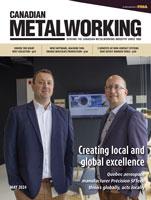- FMA
- The Fabricator
- FABTECH
- Canadian Metalworking
Managing your supply chain during COVID-19
Keep communication lines open to avoid material shortfalls
- By Canadian Metalworking
- July 17, 2020

Compared to other economic downturns, such as the 2008 recession, the cause is more defined and specific. We believe the longer and broader the stay-at-home orders remain in place, the more pervasive the longer-term impact will be on the economy. -- Stephen Schober, President/CEO Metal Supermarkets
COVID-19 has disrupted many aspects of normal life in the past few months, and manufacturing supply chains have been stretched and interrupted because of it. This month, Canadian Metalworking asked Metal Supermarkets President/CEO Stephen Schober about the effect the pandemic is having on the metal supply chain. Here’s what he had to say.
CM: How has COVID-19 affected Canada’s metal supply chain?
Schober: We have not seen a deterioration at this stage for our business specifically, but we are being attentive to possible future disruptions. At most, we have experienced reduced service levels or changes to material delivery and pickup procedures.
CM: Is this downturn different from others?
Schober: Compared to other economic downturns, such as the 2008 recession, the cause is more defined and specific. We believe the longer and broader the stay-at-home orders remain in place, the more pervasive the longer-term impact will be on the economy.
There was an expectation, fostered by governments, that the “faucet” will be turned back on quickly, but we are primarily concerned with how quickly the economy will get back to previous levels.
We also are concerned with long-term or permanent changes in consumer behaviour that will impact consumption and business conditions.
CM: Have you implemented new safety measures during this time?
Schober: Yes. Our locations currently do not permit customers to enter the retail area or warehouse, whereas previously they would have had access to browse materials and pick up orders. We have also instituted curb-side pick-up for our customers and are encouraging delivery as well. Store staff also have implemented “new normal” precautions regarding social distancing and sanitary measures.
CM: What advice would you give metalworking shops about maintaining their supply chain during this pandemic?
Schober: We have several ideas. First, maintain relationships with current suppliers but clearly ask for confirmation that items are in stock. Listen very carefully for excuses regarding delays and ask clear questions to ascertain what you are told is the complete truth or potentially masking supply chain disruption or challenges.
Second, maintain secondary supplier options and give these suppliers some business. Awarding orders to suppliers that are competitive, but not the cheapest, will help maintain relationships that you may need if supply chain disruptions arise.
Third, use common sense and prudently maintain additional inventory where merited. A lack of supply could quickly or materially impact your ability to operate if you are suddenly unable to obtain necessary or frequently used materials.
CM: Are we currently seeing shortages?
Schober: We have not experienced any at this point – but we do hear about shortages in other businesses. This is something we are closely monitoring as the pandemic continues.
CM: Is there more demand for medical-grade materials?
Schober: I am unable to comment on the demand for specific materials, but we are seeing customers frequently expanding the scope of their operation to include the development of necessary front-line personal protective equipment such as face masks.
CM: What has happened to prices since the pandemic began?
Schober: We have seen mill pricing reducing because of overcapacity at the mill level. However, suppliers are seeking to bolster margins yet reduce their inventories.
CM: Are more shops looking for credit or better terms now compared to in the past?
Schober: While I cannot comment on the volume of requests, we are advising our franchisees to be very careful with granting credit and diligent with respect to collecting accounts receivable.
CM: How can suppliers and customers best work together to ensure there are no interruptions in supply?
Schober: Remember the Russian proverb used by Ronald Reagan: “Trust, but verify.” Clear and consistent communication with all parties is critical. Pick up the phone and discuss orders and anticipated needs with your suppliers and customers. You may find it necessary to expand your lead times for orders and set realistic expectations with customers.
Metal Supermarkets, www.metalsupermarkets.com
subscribe now


Keep up to date with the latest news, events, and technology for all things metal from our pair of monthly magazines written specifically for Canadian manufacturers!
Start Your Free SubscriptionAbout the Author
- Industry Events
Automate 2024
- May 6 - 9, 2024
- Chicago, IL
ANCA Open House
- May 7 - 8, 2024
- Wixom, MI
17th annual Joint Open House
- May 8 - 9, 2024
- Oakville and Mississauga, ON Canada
MME Saskatoon
- May 28, 2024
- Saskatoon, SK Canada
CME's Health & Safety Symposium for Manufacturers
- May 29, 2024
- Mississauga, ON Canada




















